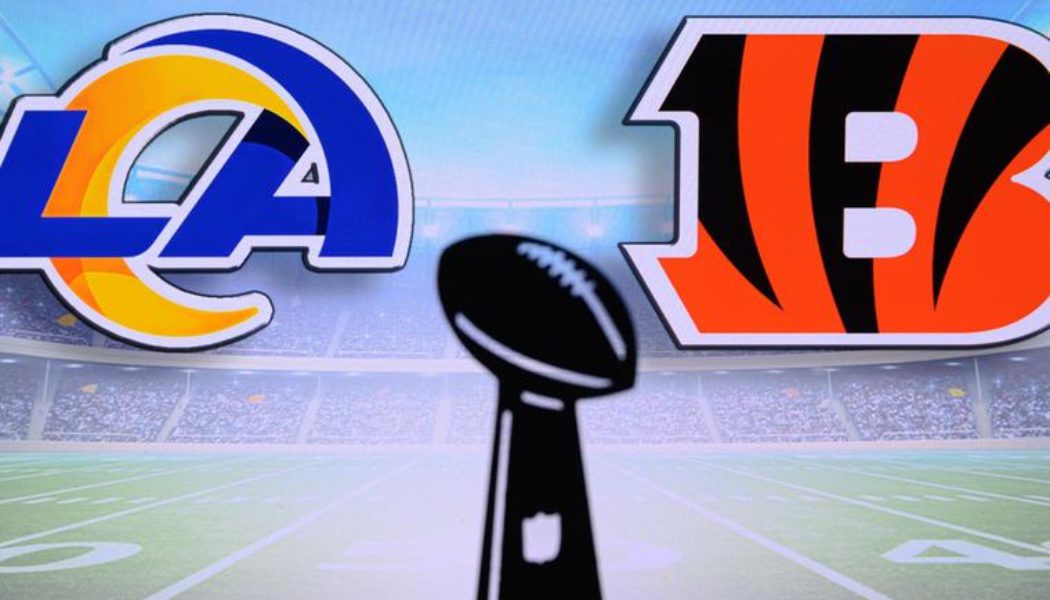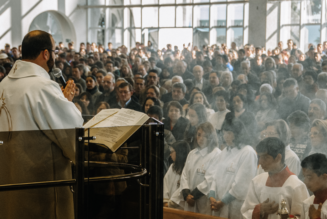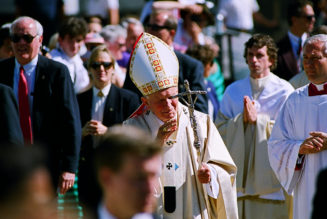
When the plucky Cincinnati Bengals square off against the star-studded Los Angeles Rams this Sunday in Super Bowl LVI, it’ll be a chance to answer some pertinent questions: Does experience trump the bravado of youth, or just bring added pressure? Can you trade your way to a championship, or is “draft and develop” the better approach? And will the NFL’s overtime rules unduly affect the outcome of yet another high-stakes playoff game?
But the performance of the nation’s most popular sport on its biggest stage is also an opportunity for Catholics to reflect on the NFL — and sports more generally — with the eyes of faith.
To help apply some theology to football, we spoke to some Catholic thinkers who also have NFL allegiances. Our roster for this Super Bowl-inspired roundtable includes Charles Camosy, a moral theologian at Fordham University and award-winning author; Dr. Kristin Collier, a professor of medicine and director of the Health, Spirituality, & Religion program at the University of Michigan medical school; Matthew Walther, a journalist and co-founder and editor of The Lamp magazine; and Elizabeth Kirk, a research associate at The Catholic University of America’s Columbus Law School and an expert on Catholic social thought and the law.
First off, please disclose your NFL allegiances, and make a case for why anyone without a team should jump on your bandwagon — bonus points for some kind of theological or scriptural justification.
CAMOSY: Despite some serious misgivings about football in general, I remain a fan of America’s team. I speak here, of course, of the Green Bay Packers — the team with the most titles in NFL history. Given that Green Bay is an incredibly small town compared to other NFL hubs, they embody the biblical principle that the last shall be first.
COLLIER: If you are without a team, are looking for a team, and looking for purification through trials, then I would encourage you to join us Detroit Lions fan. The Lions have never won a Super Bowl, and the closest they came to winning a [Super Bowl] championship was in 1991 when they lost the NFC Championship. They are also experts in losing their lead in the fourth quarter and providing their fans various trials and tribulations in the last moments of a game. In the words of St. Paul, trials produce endurance, and endurance produces character, and character produces hope. This is true! The steadfast Lions fans I know are always hopeful. Always looking ahead to the next game, the next season. Carry on #OnePride!
WALTHER: Like Kristin, I’m a Michigander, but I lack the courage to be a Lions fan. They are an existential proposition rather than a professional sports franchise to which one could owe anything resembling allegiance in the traditional sense. They invite us to consider the questions once posed by windbag 1950s theologians about the alleged meaningless of life, and to affirm our belief in the possibility of transcendence despite the testimony of our senses.
Instead, for reasons that non-obsessives would find boring and technical, I am a fan of the New England Patriots, or, more specifically, of William Stephen Belichick. (I also adore the Raiders teams of the 1970s just this side of idolatry.) That said, it would be churlish to deny my roots: “God shall send forth his mercy and truth: My soul is among lions.”
KIRK: In his Joy of Sports (which I highly recommend), the theologian and public intellectual Michael Novak said that to “watch a sports event is not like watching a set of abstract patterns. It is to take a risk, to root and be rooted.” My family roots are in Kansas City and so I root for our hometown Chiefs.
In the 1950s, Norman Rockwell was commissioned to capture the “Spirit of Kansas City,” described by Hallmark founder, Joyce Hall, as the “good in men’s hearts that makes them put service above self and accomplish the impossible.” This Spirit of Kansas City is embodied in our sports teams, like the Royals and the Chiefs, which have often won championships as scrappy underdogs, as well as our team fans, who are known for their gracious sportsmanship in both victory and defeat. If you want a team with a good, stout, Midwestern heart, the Kansas City Chiefs is your team.
So your teams are all in the NFL, a league that also tends to show most of their games smackdab in the middle of the Lord’s Day. How do you support your team while also making Sunday a day of genuine Christian rest and leisure?
CAMOSY: I used to watch football a lot more than I do, and I think it would be fair to call it an obsession. Probably an idolatrous obsession. I now rarely watch games that don’t involve the Packers, and I’m not sure that I will be watching the Super Bowl. In recent years, especially since I got married and had children, I’ve put a lot more of my free time into my family than watching hours and hours of football. In a related story, my honoring the Lord’s Day has definitely improved.
COLLIER: I try to focus on the virtue of hospitality on Super Bowl Sunday. To me, an occasion to be in the company of others, laughing, rooting for our teams, and sharing homemade food is a good thing.
We have four young boys and, because of our particular views as a family, have chosen not to watch the Super Bowl halftime shows. Various parts of the show, such as the commercials, can be an opportunity to explicitly call out and discuss the values being promoted with the children. Our boys are getting old enough to engage with questions we pose, such as “What do think is the message that is being promoted in that commercial?” or “Why do you think the advertiser has chosen to portray that person in that way?” There is learning to be had in every occasion and the Super Bowl is no exception.
WALTHER: One thing that tends to be forgotten about the NFL in the era of billion-dollar stadiums and eight-figure contracts is that within living memory professional football was a pastime of the urban poor. It was among the steel and manufacturing cities of the industrial (and later of course post-industrial) North that the pro game came into its own as something distinct from college football and far less respectable. Its earliest fans were working-class people who made their way to mud-drenched, ill-equipped stadiums from stone churches, whence many of the players themselves had come. Then as now football makes possible the innocent leisure of millions. If Don Shula, the winningest coach in the history of the game, could say the Rosary daily, I think it is possible for ordinary fans to honor the Lord’s Day.
This is certainly true, I like to think anyway, in my own household. We spend every Sunday afternoon after Mass with my maternal grandparents, and during football season this means watching the Lions lose. While our pastor is not himself a great football fan, it is very much to his credit that he celebrates the traditional Latin Mass twice on Sundays, at 8am and noon, which gives us a choice between arriving home with plenty of time to steel ourselves for the inevitable or to miss the first half entirely.
KIRK: As Pope St. John Paul II noted in his apostolic letter on the Lord’s Day, Dies Domini, “it was easier in traditionally Christian countries to keep Sunday holy because it was an almost universal practice.” Now, in order to make Sunday a unique day of both rest and celebration, Christians must stand apart sometimes in uncomfortable ways.
While living in Kansas, we were grateful that the CYO of the Archdiocese of Kansas City led by example in prohibiting games and practices on Sundays, expressing the hope that “if in even a small way we encourage reflection on our Lord’s Day or promote a society that better facilitates a Sunday of worship and rest, then our efforts can have an even greater impact.” But, in other communities, we have kept our children home from sports practices or games that conflict with our family’s celebration of Mass with our parish community, which is the heart of Sunday.
For some young people, though, watching a game later in the day can be motivation for fulfilling their Sunday obligation and developing proper priorities. As a younger member of my family put it, “I felt guilty for enjoying a Sunday with food and drinks knowing I cared perhaps a bit more about getting to the playoffs than getting to heaven. Now I love the whole Jesus-and-football Sunday thing.”
Football brings a lot of joy, but the NFL has also been mired in its own share of scandals and possible injustices. What’s one that jumps out to you, and what role do you and other fans have in addressing it?
CAMOSY: Does it really bring that much joy? I don’t feel that great when the Packers win and I feel gutted when they lose, especially in big playoff situations — which seems to happen a lot lately. I think many of us would be better off not watching football, frankly. Not just because of what it does to our psyches and our free time, but because of our participation in the violence that is led to so many brain injuries, suicides and destroyed lives. If I were a stronger person, I would go even further in not watching football.
COLLIER: As a medical doctor, closed head injuries concern me the most. Moderate to severe traumatic brain injuries, of which concussions are a part, are a known risk factor for the development of cognitive impairment, dementia and chronic traumatic encephalopathy (CTE).
We should be concerned, from a public health perspective, as well as a moral one, of the long-term effects of traumatic brain injury of any severity on cognitive aging. Any modifiable risk factors for the development of a disease, like dementia, which is expected to increase rapidly in the next few decades, are of utmost importance and should be explored — including in football. More research, partnership and advocacy is needed alongside and with existing groups like the Concussion Alliance, the American Academy of Neurology and others.
WALTHER: Like most sensible people, I was appalled by the Dolphins’ firing of Brian Flores, a brilliant coach. I felt the same way about Jim Caldwell in Detroit. The double standards under which Black head coaches labor is as inexcusable as it is undeniable. As a fan, I do not see what I can do to remedy the situation, but I hope that Flores’ lawsuit is successful and that he finds a job soon. (Should he return to New England, I would love to see him succeed Belichick one day).
A fresh source of scandal is the proliferation of online sports gambling with the not-so-tacit encouragement of the television networks, sports journalists, and the league itself. I would ban it if I could.
KIRK: Since I don’t follow the scandals of the NFL, I polled members of my extended family and even some of my students to learn what stands out to them. Among the most frequently mentioned: lack of minority representation among head coaches and management, the culture of sexual harassment and assault, the various injustices of “Deflategate,” and, of course — the unfairness of the overtime rules. Scandal in sport can have a pedagogy of its own. My great-uncle, as a young boy, was a fervent White Sox fan. The scandal of “Shoeless Joe Jackson” and the 1919 Black Sox broke his heart and, as family lore has it, he never watched baseball again. Scandal in sport demonstrates quite clearly that personal sin has social consequences, harming not only the sinner but the entire community.
The moral challenge associated with football that impacts our family most directly is the vulgar and violent commercial advertising that accompanies watching the game on TV. Years ago, before we had children, my husband and I would join friends and their young children to watch Notre Dame football away-games on NBC. The father of that family watched with remote in hand, ready to mute the volume or change the channel. Now that we have children, we follow our friends’ example. I wish that teams and sporting organizations would use their considerable influence to encourage healthier, more wholesome advertisements.
Probably in response to the over-glorification of professional sports, some folks out there in Catholic Land have a smug, almost studied disdain for the practice. They brag about it or glibly refer to organized athletic competitions as “sportsball.” What’s your Catholic apology for the good of sports? How has participation in sports — as a player, perhaps, but especially as a fan — helped you to flourish?
CAMOSY: In between my Masters and Ph.D., I taught theology at a Catholic high school and coached the JV basketball team. These three years were among the best of my life, not least because of the wonderful community that sports can create and the absolutely phenomenal experience of seeing the growth of my boys over time. (Especially, I have to say, when it came to growth in their commitment to play defense — which is 90% about one’s attitude and desire.) I think basketball, baseball, soccer and many other sports show that you don’t need the violence of football to see the good of sports as it helps activate the fullness of a flourishing human life.
COLLIER: I’ve been lucky to be a player of sports and a spectator of some incredible sports moments, like Michigan’s defeat of Ohio State at the Big House during my senior year of college. The victory propelled us to the Rose Bowl and an eventual national championship, and I’m reminded of the joy of that experience whenever I see the iconic photo of Charles Woodson with a rose in his mouth, taken after the game.
Peter Leithart once wrote that “sports can … provide ‘signals of transcendence’ in a secularized world.” I couldn’t agree more! Experiences of meaning making, transformation, self-forgiveness, rejuvenation, self-sacrifice and ritual abide! But also, sports celebrate our “creatureliness” in a way that is quite unique. Our bodies in all their glory, magnificence and at times frailty, are on display in the world of sports.
In our current age, where so many things are done on one’s own, there is something that feels special, dare I say transcendent, about a communal experience like being part of a crowd rooting for your team against its rival or cheering for the underdog. We have many opportunities to flourish within sports and within the watching of sports in the virtues of perseverance, overcoming of the odds, working for a common goal, and being part of something larger than yourself. Ignore the haters!
WALTHER: Here I am tempted to insert the phrase “watched football” into a well-known passage from the Autobiography of Bertrand Russell: “I have watched football, first, because it brings ecstasy — ecstasy so great that I would often have sacrificed all the rest of life for a few hours of this joy. I have sought it, next, because it relieves loneliness — that terrible loneliness in which one shivering consciousness looks over the rim of the world into the cold unfathomable lifeless abyss. I have sought it finally, because … I have seen, in a mystic miniature, the prefiguring vision of the heaven that saints and poets have imagined.”
More seriously, football, like any activity that is not intrinsically disordered and requires discipline and the pursuit of excellence for its own sake, can be and is oriented to the glory of God. It requires apology no more than knitting or detective novels. As for my own memories of playing the game, save for occasional ill-advised backyard tussles with other fathers (bibere Coorsum usque ad hilaritatem per se non est illicitum), they are as remote as they are undistinguished.
KIRK: Smug disdain is never very appealing, and it overlooks the authentic human good of sport. Pope St. John Paul II gave thanks “to God for the gift of sport, in which the human person exercises his body, intellect and will, recognizing these abilities as so many gifts of his Creator.” Achieving excellence in sports can be a way of giving glory to God, and when rightly ordered is a powerful example of many virtues including patience, self-control, obedience, humility, and perseverance.
Sports can foster bonds of charity among teammates, communities, and even cultures and nations. In my own experience, sharing a love of a team has helped unite generations within a family. For many years, I would send articles about Notre Dame football to my grandfather and even read them aloud to him during his final illness. It was a shared loyalty that brought us both much joy. My parents host watch parties with their teenage grandchildren and jump up and down, shouting together in the living room, when Mahomes connects for a great play. As a young girl, I cheered for George Brett and the Royals in the 1985 World Series and 30 years later took great delight as a parent when my children fell in love with baseball and the Royals in the 2015 World Series.
All right, Rams vs. Bengals in Super Bowl LVI. Who are you pulling for, and who do you think will end up hoisting the Lombardi Trophy?
CAMOSY: I’m not sure I care all that much, but in the spirit of promoting defense I’ll go with Aaron Donald and the Rams.
COLLIER: As a Lions fan, how can I not root for our former quarterback Matt Stafford and his L.A. Rams? Rams all the way baby! I think with the combined power of all the Rams and Lions fans rooting for Stafford, he and his team have a clear advantage. And if they don’t win, I already have a lot of experience to fall back on in my years of disappointment as a Lions fan that has engendered perseverance and hope in me, to get me through the post-season and look forward to the next one.
WALTHER: Forty years ago, Frederick Exley declared, “We must all root for the Bengals.” I wish I could agree with the author of A Fan’s Notes, for my money the best book ever written on the subject of professional football. But like everyone else in the state of Michigan, I am pulling for Los Angeles and, more to the point, for Matthew Stafford. With the exception of Philip Rivers, who retired at the end of the 2020 season, it is difficult to think of a quarterback more deserving of a Super Bowl ring.
As for my prediction, consider the words of the Prophet Daniel: “I saw the ram pushing westward, and northward, and southward; so that no beasts might stand before him, neither was there any that could deliver out of his hand; but he did according to his will, and became great.”
KIRK: I am agnostic on this question. Given my tendency to connect my team allegiance to my rootedness in a particular community, I will cheer for the Rams. My daughter was born in L.A. and considers herself a California girl. Also, the Rams spent 20 years in St. Louis and for this proud daughter of the Show-Me State, that’s good enough for me. Go Rams!
Join Our Telegram Group : Salvation & Prosperity









